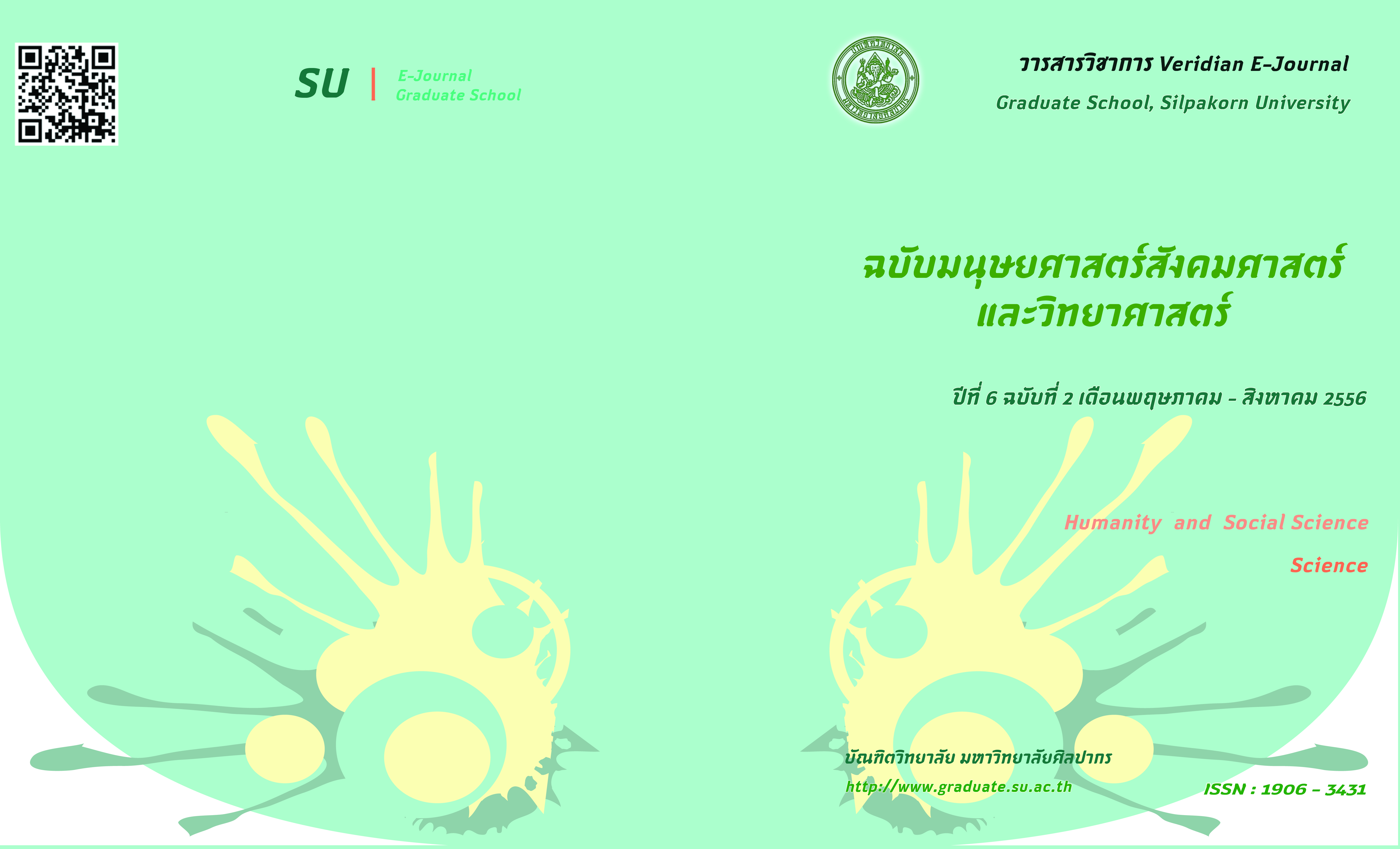การพัฒนาผลการเรียนรู้เรื่องโจทย์ปัญหาระคน ของนักเรียนชั้นประถมศึกษาปีที่ 4 ที่จัดการเรียนรู้โดยใช้สมองเป็นฐาน (BBL) ร่วมกับเทคนิค KWDL
Main Article Content
บทคัดย่อ
บทคัดย่อ
การวิจัยครั้งนี้มีวัตถุประสงค์เพื่อ 1) เปรียบเทียบผลการเรียนรู้เรื่อง โจทย์ปัญหาระคน ของนักเรียนชั้นประถมศึกษาปีที่ 4 ก่อนและหลังจัดการเรียนรู้โดยใช้สมองเป็นฐาน (BBL) ร่วมกับเทคนิค KWDL 2) ศึกษาความพึงพอใจของนักเรียนชั้นประถมศึกษาปีที่ 4 ที่มีต่อการจัดการเรียนรู้โดยใช้สมองเป็นฐาน(BBL) ร่วมกับเทคนิค KWDL กลุ่มตัวอย่างคือ นักเรียนชั้นประถมศึกษาปีที่ 4/1 ภาคเรียนที่ 2 ปีการศึกษา 2555 โรงเรียนสาธิตแห่งมหาวิทยาลัยเกษตรศาสตร์ วิทยาเขตกำแพงแสน ศูนย์วิจัยและพัฒนาการศึกษา จำนวน 40 คน เครื่องมือที่ใช้ในการวิจัยประกอบด้วย 1) แผนการจัดการเรียนรู้โดยใช้สมองเป็นฐาน(BBL) ร่วมกับเทคนิค KWDL 2) แบบทดสอบวัดผลการเรียนรู้ เรื่อง โจทย์ปัญหาระคน 3) แบบประเมินความพึงพอใจ การวิเคราะห์ข้อมูลใช้ค่าเฉลี่ย () ส่วนเบี่ยงเบนมาตรฐาน (S.D.) และการทดสอบค่าที (t - test) แบบ dependent
ผลการวิจัยพบว่า
1) ผลการเรียนรู้เรื่องโจทย์ปัญหาระคน ก่อนและหลังการจัดการเรียนรู้โดยใช้สมองเป็นฐาน (BBL) ร่วมกับเทคนิค KWDL แตกต่างกันอย่างมีนัยสำคัญทางสถิติที่ระดับ .05 ซึ่งสอดคล้องกับสมมติฐานที่ตั้งไว้ โดยมีคะแนนเฉลี่ยหลังเรียนสูงกว่าคะแนนก่อนเรียน
2) นักเรียนพึงพอใจต่อการจัดกิจกรรมการเรียนรู้โดยใช้สมองเป็นฐาน (BBL) ร่วมกับเทคนิค KWDL ในระดับมาก
Abstract
The purposes of this research were: 1) to compare learning outcomes on mix- problems of fourth grade students before and after being taught by brain-based learning (BBL) together with KWDL technique. 2) to study the fourth grade student's satisfaction towards the brain-based learning (BBL) together with KWDL technique. The sample consisted of 40 fourth grade students of Kasetsart university laboratory school, Kamphang Saen campus, research and development education center in the second semester academic year 2012. Instruments used to collect data were lesson plans, learning outcomes test on mix-problem and thequestionnaire used for asking the student's satisfaction towards the brain-based learning (BBL) together with KWDL technique. The statistical analysis was accomplished by mean (), standard deviation (S.D.), t-test dependent.
The results of this research were:
1) Learning outcomes on mix-problems of fourth grade students before and after taught by brain-based learning (BBL) together with KWDL technique were statistically significant different at .05 level. The mean scores of students' learning outcomes on mix-problems after the learning were higher than before the learning.
2) The fourth grade student's satisfaction towards the instruction on mix-problems by brain-based learning (BBL) together with KWDL technique were at a high level of satisfactions.

